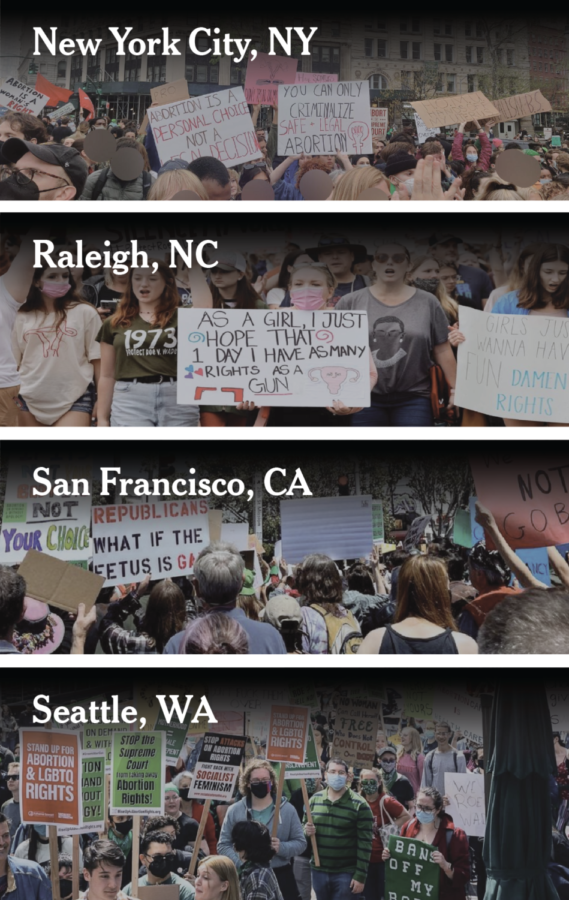Supreme Court Majority Votes To Overturn Roe, Prompting Protests Across the Nation
Activists Express Outrage As Nation Envisions Era Without Roe
A Supreme Court majority draft opinion overturning Roe v. Wade was leaked on May 2, signaling the court’s readiness to undo a landmark decision that had federally protected a woman’s right to abortion for decades.
The leak sparked outrage among pro-abortion rights activists and concern among those on both sides of the issue who worry that it is yet another indication of the court’s politicization. Protests erupted nationwide — spanning from the Supreme Court Building to justices’ homes and reaching as far as San Francisco and Raleigh. Demonstrators’ signs conveyed a myriad of messages and ideologies, like ‘Women’s rights = human rights,’ ‘Bans of our bodies’, ‘Let their hearts beat,’ and ‘Unborn lives matter.’
Although the decision is not final, if Roe v. Wade were overturned, the right to an abortion would no longer be federally protected. This would allow states to take their own stance on the issue, meaning they could prohibit the procedure altogether, even in cases of incest or rape.
Many conservative states have trigger laws that would swiftly ban abortions if Roe is struck down. Over three dozen states have pending legislation that could potentially ban abortion completely. In an effort to counteract these restrictions, more liberal states like Connecticut are working to offer abortion services to women who live in states where the procedure will be banned.
On May 11, Senate Democrats attempted to include abortion rights into federal law by proposing a bill, titled the Women’s Health Protection Act, that would guarantee abortion access and ban a variety of restrictions.
However, they fell short of the 60 votes required to pass the law, as Senators voted 51-49 against it. Democrat Joe Manchin III of West Virginia, who has openly expressed anti-abortion views, joined a unanimous Republican front in shutting down the proposed legislation.
The Act also lost the support of Republican Senators Lisa Murkowski of Alaska and Susan Collins of Maine, who had previously backed abortion rights. They cited the proposal as overly expansive, saying that they want to preserve the status quo, not challenge restrictions that are already in place.
President Joe Biden issued a statement declaring that his administration would challenge the reversal of Roe v. Wade if the court officially votes to overturn it. He called upon the public to vote for more pro-choice senators and representatives to produce the majority required to support his work of codifying the case’s initial ruling into law.
Charlotte Mooney ’23, the head of Bluestockings, a school club that promotes intersectional feminism and gender equality, commented on how these changes might affect the school community. “Because Hotchkiss is in Connecticut, it’s definitely safer for women to have the self-autonomy to choose whether to have an abortion or not, but I think it’s still affecting a lot of women that they have to have certain laws on their body,” she said. “A lot of people don’t understand that being pro-choice does not necessarily mean that you want to have an abortion, it’s having the right to choose.”
Roe v. Wade has been the legal precedent — however controversial — for the past 50 years. With three new justices appointed in a single presidential term by former President Donald Trump, the character of the court has evidently shifted politically to a more conservative composition.
This shift in the court has opened the door for the reversal of Roe v. Wade. Duncan Griffin ’22, head of the Republicans Club, agreed with the decision. “Politics aside, I’m actually very glad this is happening, not because of political views on abortion but because of questions of power in the government,” he said. “[Associate Justice Samuel] Alito’s whole point is the Supreme Court does not have the power to change the law so in this circumstance he’s just overturning what he believes in. The Supreme Court does hold that power to oppose.”
Chief Justice Roberts confirmed the authenticity of the 98-page document in a statement in which he noted that the draft did not represent a final decision by the court or any individual member. Roberts also announced that an investigation has been launched to find the person or group that leaked the document.
Prior to this instance, no full draft opinion had ever been leaked in the modern history of the court. However, there had been instances when official decisions have been leaked to the public prematurely. In 1973, the original Supreme Court decision on Roe v. Wade was leaked mere hours before the information was made public.
A final decision from the court can be expected before June which marks the end of the court’s session until the fall.






